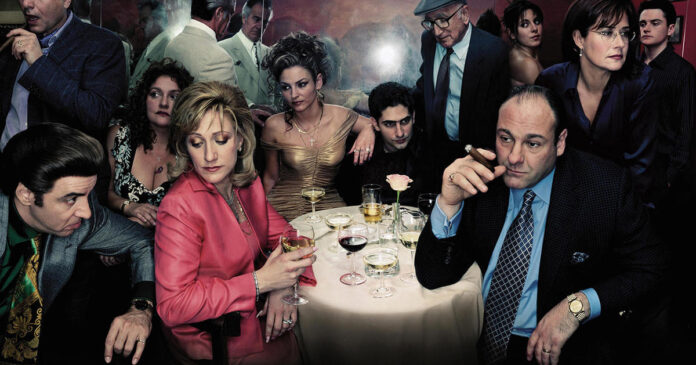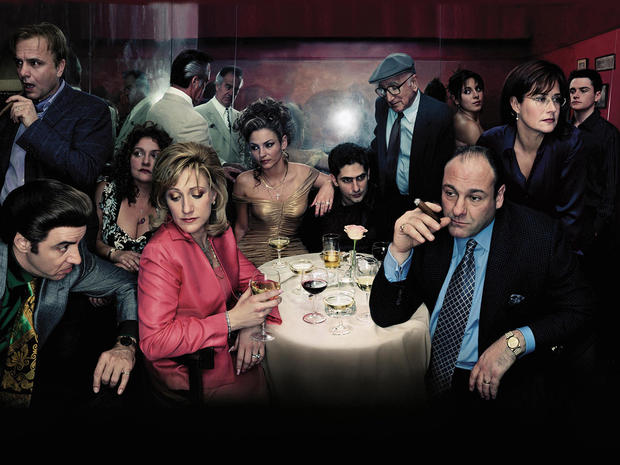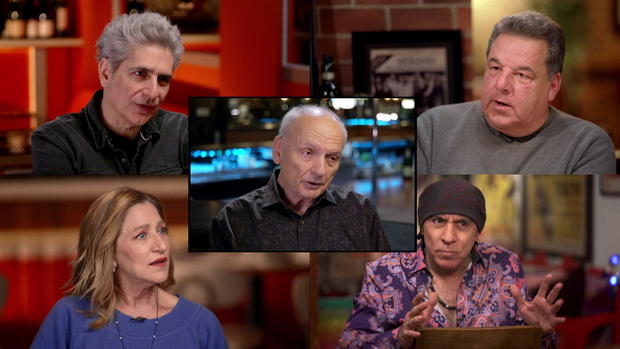This year marks the celebration of the debut of “The Sopranos” a quarter-century ago. The hit HBO drama about a mob family headquartered in a New Jersey strip club would change television.
“I had a lot of friends who were auditioning for this thing called ‘Sopranos,'” said actress Edie Falco. “I thought it was about singers.”
Steve Van Zandt recalled, “He calls and says, you know, ‘You wanna be in my new TV show?’ And I say, ‘Yeah, no thanks!'”
Michael Imperioli said, “A series on HBO was kinda like the bargain basement, and I’m not being facetious.”
Series creator David Chase, whose past credits included “The Rockford Files” and “Northern Exposure,” had offered “The Sopranos” to all of the broadcast networks. Their reaction? “Too dark,” he said.
But it could be darkly funny, too. “I’ve never been able to figure out whether it’s a comedy,” said Chase. “I guess it’s like life. I don’t know, I hope.”
It started as a show about a mob boss with a troublesome mom. Chase, who grew up in suburban New Jersey, based her on his own mother. “I believe that if my mother had been male, she might have been a criminal,” he said. “Nancy Marchand just brought it to life.”
Tormented, Tony Soprano is driven to see a therapist, Dr. Melfi, played by Lorraine Bracco.
Mason asked, “So, you base Tony’s mother on your mother, and you based the therapist on your therapist?”
“I think I was probably trying to re-mother myself,” said Chase. “I was looking for a woman of my mother’s age, who wouldn’t behave like a maniac.”
“And that’s what Tony’s trying to do?”
“Yeah, yeah.”
But Chase also saw “The Sopranos” as a parable of America in decline: “At that time in America, there was so much consumption, greed, that it was enough to make a mob boss sick.”
The late James Gandolfini played Tony as an endearing anti-hero. “He’s incredible,” said Chase. “Well, the whole thing’s about his face and about his eyes, actually. There’s something about his eyes that – it was otherworldly.”
Watch: “Sopranos” costars on James Gandolfini (Web exclusive)
Edie Falco played Tony’s wife, Carmela. Of their dynamic she said, “It’s a matter of alchemy. We both had Italian families, had some idea of what this dynamic feels like, and just sort of fell into it with great ease. It was, you know, a 10-year marriage. And it was as close to a real one as I had known.”
Musician Steve Van Zandt played Tony’s underboss, Silvio Dante. “Which I was very comfortable with, having, you know, done that kind of a thing with Bruce Springsteen in real life, you know?”
There had never been anything like it on TV. “No stars, too many characters, no seductive lighting, no cute camera moves, nothing other than this very weird story of a mob boss who has a nervous breakdown because ducks flew out of his pool,” said Van Zandt. “That’s the makings of a hit show?”
More than a hit, it’s become an enduring cultural phenomenon, constantly rediscovered by new audiences.
Asked what he thinks the magic is, Michael Imperioli (who played Tony’s hotheaded nephew, Christopher Moltisanti), said, “Well, first of all, it’s really good. Script after script, it would get more interesting and deeper. By the end of the first season I was like, This is incredible.”
Falco said, “It was like, you know, I guess a musician playing Bach or something. It’s like, ‘Ah, this is just an honor.'”
Van Zandt said, “Within two shows, everybody’s stopping me on the street: ‘Sopranos, Sopranos, Sopranos.’ The fact that I had been a rock star for 20 years before that? Gone!”
Steve Schirripa joined the cast in the second season as Bobby Baccalieri. “We would go out, five or six of us, and get a standing ovation. It was like playing for the Yankees! We were sincerely friends on and off. The only tense day I can remember, honestly, was the day we whacked Vinny Pastore, you know, Big Pussy. ‘Cause, you know, when you kill somebody, or they die on a show, you’re not gonna see ‘em anymore.”
It was a fate all the actors knew they could face. “The more they gave you to do, your character, the better shot of you getting killed off!” Schirripa laughed. “I didn’t buy an apartment here until the show was over!”
Schirripa got a call one night from David Chase, who asked to come over.
Had that ever happened before? “Noooo!” Schirripa laughed. “He doesn’t come to your house! How they killed you then became a badge of honor. Was it a good kill, or did you fade away? Mine was pretty good – the train store, you know?”
After 10 years of filming, the final episode of “The Sopranos” aired in 2007. Falco said that during the read-through she started crying: “I was out of control. I was embarrassed. I really couldn’t stop crying, it was ridiculous. … It was, This thing in this moment will never happen again to me, to anyone.“
“It changed a lot of people’s lives,” said Mason.
“I think all of ours, in all kinds of ways,” Falco said.
The ending, an abrupt cut to black, was controversial. Imperioli said, “My initial thing was, ‘Did the TV go out?,’ like everybody! But the ambiguities of that I felt were really interesting. Did he die? Is that the last thing he saw? I mean, those questions lingered that people tried to figure out.”
WATCH: The final scene of “The Sopranos” (Original air date: June 10, 2007):
Mason asked Chase, “You kinda left room for everybody to make up their own ending?”
“Yeah. That was not my intention,” he replied.
“What was your intention?”
There was a long silence, as Chase stopped to think. “I don’t know how to explain it,” he said. “Life is precious. I don’t think if we had done – if he had gone to prison or if he’d died with his face in the linguini, I don’t think we woulda thought that.”
For more info:
- “The Sopranos” streams on Max
- “The Many Saints of Newark” available on Max
- “Not Fade Away” is available via Amazon Prime
- Tribeca Festival: “Sopranos” 25th Anniversary Reunion: “WISE GUY” David Chase and “The Sopranos”
- “Woke Up This Morning: The Definitive Oral History of ‘The Sopranos'” by Michael Imperioli & Steve Schirripa, with Philip Lerman (William Morrow), in Hardcover, Trade Paperback, eBook and Audio formats, available via Amazon, Barnes & Noble and Bookshop.org
- “Talking Sopranos” podcast
- Follow Steve Schirripa on Instagram
- Follow Michael Imperioli on Instagram
- “On Locations: Lessons Learned from My Life On Set with ‘The Sopranos’ and in the Film Industry” by Mark Kamine (Steerforth), in Hardcover, eBook and Audio formats, available via Amazon, Barnes & Noble and Bookshop.org
- Steven Van Zandt Official Site (littlesteven.com)
- Edie Falco (emmys.com)
- On-Location Tours, NYC: “Sopranos” Sites Tour
- Thanks to Da Nico Ristorante, Bar Dalia, and the Civilian Hotel, New York City
Story produced by Jon Carras. Editor: Mike Levine.
See also:
Source : Cbs News
















